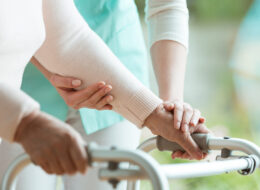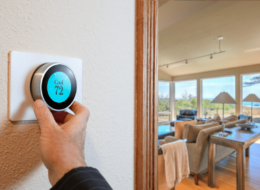Do you or your elderly loved one often feel cold, even when it’s not particularly chilly outside?
If so, you’re not alone.
Feeling cold is a common complaint among seniors, and there are a number of possible explanations for why an older adult may often find themselves chilly.
In this article, we’ll explore some of the most common reasons why seniors may feel cold — and we’ll make sure to offer some helpful tips for staying warm and cozy!
1. Poor Circulation
Poor circulation can be a serious concern for seniors due to pre-existing health conditions, as well as (or exacerbated by) a lack of regular activity.
Poor circulation can lead to a decrease in the flow of blood to various parts of the body, causing an overall chilliness.
Seniors who suffer from poor circulation may want to consider employing the use of arthritic compression gloves, which can help increase circulation through gentle compression, allowing one’s fingers to maintain warmth better.
2. Medication Side Effects
There are many medications that may result in cold intolerance as a side effect.
Examples include beta-blockers, which are used to treat high blood pressure, and calcium channel blockers. These medications can interfere with the body’s ability to regulate its temperature, leading to feeling cold.
3. Decreased Metabolism
As people age, their bodies go through various changes that can make them more susceptible to feeling cold.
One of the main changes is a decreased metabolism, which can make it more difficult for the body to regulate its temperature.
Additionally, the skin becomes thinner, which can make it harder to retain heat.
4. Hypothyroidism
Hypothyroidism is a condition in which the thyroid gland does not produce enough thyroid hormone. This hormone is responsible for regulating the body’s metabolism, so a lack of it can slow down your metabolism even more, making it even more challenging for the body to generate heat and maintain a proper body temperature.
Hypothyroidism can cause a variety of other symptoms too, such as:
- Fatigue
- Slower heart rate
- Weight gain
- Constipation
- Depressed
5. Anemia
Anemia is a condition in which the body does not have enough healthy red blood cells or hemoglobin, leading to reduced oxygen flow to the body’s organs.
This can cause symptoms including fatigue, weakness, and cold sensitivity, among others.
Anemia can be caused by a lack of iron in the diet, a chronic health condition, or the result of a medication side effect.
Since your hemoglobin is responsible for carrying oxygen throughout the body, a lack of it can make it difficult for the body to generate heat and lower one’s body temperature.
If you suspect that you may have anemia, it’s important to speak with your doctor right away. A diagnosis can be made through a blood test and your doctor may recommend dietary changes, iron or vitamin supplements, or medication to help increase the levels of hemoglobin in your body.
6. Raynaud’s Syndrome
Raynaud’s Syndrome is a condition in which causes spasms in the small blood vessels of the fingers and toes, causing them to feel cold in the extremities and even numb or with a pins and needles sensation.
If you feel like you always seem to have cold hands, you could have Raynaud’s syndrome. For some sufferers, one’s fingers may even turn white or blue from the reduced blood flow.
Raynaud’s attacks are often triggered by cold weather or stress.
Most individuals with mild Raynaud’s syndrome symptoms manage it through lifestyle changes, such as wearing gloves frequently, avoiding cold areas, or carrying hot packs for attacks.
Mild Raynaud’s attacks usually last around 15 minutes, with sensation returning to the fingers shortly after.
While Raynaud’s disease is fairly common, affecting approximately 1 in 20 people in the US. It’s also not usually dangerous or any serious cause for concern.
However, there is a different form of the disease called Raynaud’s phenomenon which can be more severe and dangerous, potentially resulting in skin ulcers or even gangrene. The more dangerous Raynaud’s phenomenon can be treated with medications or procedures.
Thankfully, this is much less common than the milder Raynaud’s syndrome.
Make sure to consult with your doctor to better determine which type of Raynaud’s disease you have.
7. Not Wearing Warm Enough Clothing
Feeling cold is a common problem for seniors, especially when they dress in clothing that isn’t suitable for the weather.
Older seniors may find that they need to dress in more layers than they used to, due to the fact that we often lose fat and thin out as we age.
Most folks probably don’t have any qualms with losing a fat layer or two, but you need to substitute that lost fat with warm clothing to better
Even if the temperature isn’t necessarily cold, it’s important to remember that seniors’ bodies don’t always retain heat well.
The best solution for seniors is layering! Wearing multiple layers is a great way to get extra warmth, and you can always remove layers if you feel too warm instead of feeling uncomfortable and shivering due to a lack of insulation.
A cozy blanket for an elderly senior or a throw at home can also provide some extra warmth if needed.
8. Being in a Draft Room or House
Senior citizens can often struggle to feel warm and cozy if they live in a drafty house or spend most of their time in a poorly-insulated part of the home.
A strong draft can quickly strip away any sense of comfort — especially if you live in an area that gets cold weather.
This is why it’s essential to ensure that an elderly family member’s home is properly insulated so that they can stay warm more easily.
There are several steps you can take to winterize a home, such as:
- Use a heat-detection infrared gun to find areas of the home that are poorly insulated
- Fill gaps around window trim with caulk
- Add weatherstripping to any gaps in doors or windows
- Add door sweeps
- Install felt and outlet socket pads to keep drafts sealed
- Seal plastic around windows during the winter
- Install heavy curtains across the windows to better keep the cold out
If insulation is especially poor, you may need to hire a company to come and blast insulation between the walls. Adding insulation won’t just keep when it comes to keeping seniors warm — it’ll save them money in the long run too through lowered heating costs.
Some states even offer programs where they will add insulation throughout your home, free of charge. See our full article about free and discounted home repair programs for seniors to get a better idea of what may be offered in your area.
9. Not Eating Enough Food
For seniors, not eating enough can be an easy trap to fall into. A decrease in appetite is a common sign of aging, and with cooking being a bit more of a hassle as one ages, it’s no surprise some seniors end up not taking in enough nutrients.
But, it’s important to make sure that you are still following a healthy diet and getting all the necessary vitamins and minerals to keep your body fueled.
When your body isn’t getting enough fuel, it won’t run properly and can produce a feeling of coldness.
Make sure that you’re eating meals that contain nutrient-rich foods like lean proteins, fruits, veggies, and whole grains to help ensure your body has what it needs to operate efficiently!
And if cooking is becoming so much of a hassle that it prevents you from eating well, consider signing up for meal delivery programs, aid programs like Meals on Wheels, or pre-packaged meals that can be easily prepared through the use of an easy-to-use microwave or toaster oven.
Other Tips for Keeping Elderly Seniors Warm
Keeping curtains or blinds closed when the sun is going down, wearing several layers of light clothing, using a hot water bottle or electric heating pad.
- Slippers. A cozy pair of indoor house slippers for elderly seniors can be just the thing for keeping toes warm and maintaining body heat.
- Sip warm drinks. Warm beverages can help to raise your body temperature. It’s an especially good idea to start the morning off with a warm drink, such as hot water with lemon.
- Take warm baths or showers before bedtime. Taking a bath or shower can help your body relax and keep one’s body temperature higher.
- Do some light exercises or stretching. It’s important to stay active in order to keep blood flow moving, so easy exercises like light walking, yoga, or stretching is a smart idea.
- Take hot baths. A warm bath will help to draw heat into the body, increasing one’s body temperatures and relaxing your muscles.
- Dress warmly. When dealing with cold temperatures, always overdress rather than underdress. After all, you can always remove layers, but you can’t easily add more! Wear thick and warm sweaters, socks, and snow boots if you plan on being outside in cold temperatures.
- Stay hydrated. Drinking plenty of water throughout the day can help to keep your body temperature regulated.
- Invest in a good electric blanket. Electric blankets are a great way to stay warm without using too much heating energy. Plus, they come with multiple heat settings so you can find just the right warmth for you!
- Avoid caffeine and alcohol. Both of these can make you feel colder as they interfere with your body’s ability to keep itself warm.
- Eat foods high in omega-3 fatty acids like salmon, nuts and avocados. These healthy fats help your body regulate its temperature so it stays warmer during cold weather.
- Add extra blankets or quilts to beds. If you feel cold in bed at night, consider adding an extra layer of blankets or quilts to your bed — especially during those chilly winter nights.
- Rearrange furniture away from windows. This will position seniors away from areas where cold air comes in, helping them feel warmer.
- Use a hot water bottle. A hot water bottle is an easy way to stay warm without using electricity. Just be careful to wrap the hot water bottle in padding to avoid burns.
These are just some ideas for keeping elderly seniors feeling warm during colder months. As always, it’s important to listen to your body and know when you need rest or additional heat. Taking the proper precautions can help make cold weather just a bit more bearable!
Can feeling cold be a sign of a serious health issue?
Yes, feeling cold can be a sign of a serious underlying health issue, such as hypothyroidism or anemia. However, it can just as often be due to a treatable issue, such as not wearing warm enough clothing, a drafty house, or Raynaud’s syndrome (which is fairly common and treatable through lifestyle adjustments).
Can medications cause cold intolerance?
Yes, there are several medications that can cause cold intolerance as a side effect, such as certain beta-blockers. It’s important to speak with your healthcare provider if you are experiencing cold intolerance while taking medication, as it may be a side effect of what you’re taking.
Everyone deserves to feel comfortable and cozy in their own homes.
Unfortunately, for some elderly seniors keeping warm can be a real challenge. Whether due to medication side effects or thinning bodies, there are many steps you can take to feel warmer and keep the cold at bay!
Do you have any other tips for staying warm for seniors? Share in the comments below!




